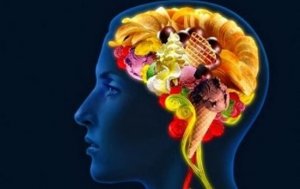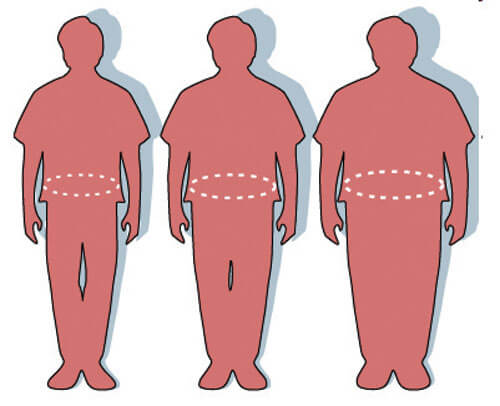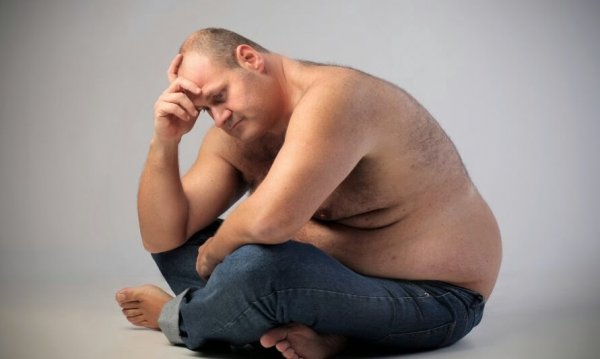What's the Relationship Between Emotions and Obesity?

Obesity is a major health issue in the modern world. Science still hasn’t managed to explain 100% of the microbiological processes that lead to being overweight. We know there are multiple factors, but some of them are still a mystery.
We do know for sure that the number of cases of obesity has gone up worldwide. The World Health Organization calls it an epidemic. Especially in countries like the US, the UK, Mexico, and China, where the number of overweight people has doubled and in some cases tripled.
“Lighten your load to walk a good path and learn to live with what the sea brings you… Every object we love and possess, every burden we carry through life, along with its useful weight, it’s inevitably extra heavy…”
-Luis Chiozza-
This situation has created myths and biases around the issue of obesity. People associate it with a lack of self-control, though this isn’t always true. Some people kill themselves with hunger and even then they don’t lose any weight.
They also hurtfully associate it with ugliness and undesirability. It’s easy to see how emotionally charged the subject is.
People started to study the influence of emotions on obesity a few decades ago. Low-calorie diets and constant exercise aren’t always all it takes to get the best results. This has made people think there may be other factors, ones dealing with our unconscious.
Weight and Obesity
From a strictly anatomical point of view, fat accumulation in the body doesn’t always lead to obesity. The more fat there is, the heavier a person is. That’s obvious.
What’s not so obvious is whether this increase in a person’s fat content is reflected in their overall weight. Oftentimes, as fat content increases, muscle mass decreases.

This means that how many pounds someone weighs doesn’t necessarily reflect the amount of fat in their body. And losing weight doesn’t mean looking skinny. Ultimately, what worries a lot of people isn’t their body weight, it’s their body’s shape.
Fat accumulated in certain areas becomes visible and undesirable, because we have an idea of what a perfect figure is. Someone with “love handles” or a stomach that sticks out might weigh the same as a person who’s more slender, but has more muscle.
In the end, weight by itself isn’t the problem. What psychologically impacts a lot of people is the contrast between their figure and the “perfect” figure.
Unconscious Factors in Obesity
According to the doctor Luis Chiozza, there is important scientific evidence about weight gain. Some people tend to accumulate fat more “easily.” Their bodies also display a special resistance to using up the accumulated fat.
The Argentinian doctor wanted to establish a cause for this phenomenon. So he turned to the essential function of body fat: serving as a calorie or energy reserve.

This author indicates that there are unconscious “fantasies” associated with the retention of fat in the body. He suggests that, at the beginning, the accumulation of body fat is an adaptive response.
It responds to the possibility that there might be hard times to come. We reserve it so we’ll have something to use as a backup if there’s any need. For example, migratory birds increase the amount of fat in their bodies before their exhausting journeys.
Fat accumulates in humans as a result of a fantasy of long term reserves. This fantasy is linked to another fantasy of “self-sufficiency.” It means not needing anything from anyone besides yourself. That way you can guarantee your survival.
Finally, a change in body shape corresponds to a third fantasy. It’s the fantasy of getting out of shape. Or to put it another way, of getting out of the ideal shape.
Obesity as a defense mechanism
Doctor Chiozza concludes that obesity might be a kind of defense mechanism. It would happen when there’s an unconscious conflict related to a feeling of incompetence.
Accumulated fat is a way of reserving ourselves for an action. It’s one we ultimately don’t undertake out of fear of not being able to do it right.
The increase in overweight people could be a kind of compensation for that feeling of defenselessness. Ultimately, we can’t bear feeling incompetent. The conflict hides itself under a cloak of obesity.
To conclude, let’s distinguish two things when it comes to obesity. There’s the physical risk some people have by being overweight. And then there’s the psychological one of not lining up with society’s idea of what beauty is.
Both circumstances normally coexist. That’s why a proper evaluation is needed. Then, a person’s motivation could be used to their advantage, so they’ll follow specific diet and exercise guidelines. Along with metabolism, these are the main regulators of our weight.
Obesity is a major health issue in the modern world. Science still hasn’t managed to explain 100% of the microbiological processes that lead to being overweight. We know there are multiple factors, but some of them are still a mystery.
We do know for sure that the number of cases of obesity has gone up worldwide. The World Health Organization calls it an epidemic. Especially in countries like the US, the UK, Mexico, and China, where the number of overweight people has doubled and in some cases tripled.
“Lighten your load to walk a good path and learn to live with what the sea brings you… Every object we love and possess, every burden we carry through life, along with its useful weight, it’s inevitably extra heavy…”
-Luis Chiozza-
This situation has created myths and biases around the issue of obesity. People associate it with a lack of self-control, though this isn’t always true. Some people kill themselves with hunger and even then they don’t lose any weight.
They also hurtfully associate it with ugliness and undesirability. It’s easy to see how emotionally charged the subject is.
People started to study the influence of emotions on obesity a few decades ago. Low-calorie diets and constant exercise aren’t always all it takes to get the best results. This has made people think there may be other factors, ones dealing with our unconscious.
Weight and Obesity
From a strictly anatomical point of view, fat accumulation in the body doesn’t always lead to obesity. The more fat there is, the heavier a person is. That’s obvious.
What’s not so obvious is whether this increase in a person’s fat content is reflected in their overall weight. Oftentimes, as fat content increases, muscle mass decreases.

This means that how many pounds someone weighs doesn’t necessarily reflect the amount of fat in their body. And losing weight doesn’t mean looking skinny. Ultimately, what worries a lot of people isn’t their body weight, it’s their body’s shape.
Fat accumulated in certain areas becomes visible and undesirable, because we have an idea of what a perfect figure is. Someone with “love handles” or a stomach that sticks out might weigh the same as a person who’s more slender, but has more muscle.
In the end, weight by itself isn’t the problem. What psychologically impacts a lot of people is the contrast between their figure and the “perfect” figure.
Unconscious Factors in Obesity
According to the doctor Luis Chiozza, there is important scientific evidence about weight gain. Some people tend to accumulate fat more “easily.” Their bodies also display a special resistance to using up the accumulated fat.
The Argentinian doctor wanted to establish a cause for this phenomenon. So he turned to the essential function of body fat: serving as a calorie or energy reserve.

This author indicates that there are unconscious “fantasies” associated with the retention of fat in the body. He suggests that, at the beginning, the accumulation of body fat is an adaptive response.
It responds to the possibility that there might be hard times to come. We reserve it so we’ll have something to use as a backup if there’s any need. For example, migratory birds increase the amount of fat in their bodies before their exhausting journeys.
Fat accumulates in humans as a result of a fantasy of long term reserves. This fantasy is linked to another fantasy of “self-sufficiency.” It means not needing anything from anyone besides yourself. That way you can guarantee your survival.
Finally, a change in body shape corresponds to a third fantasy. It’s the fantasy of getting out of shape. Or to put it another way, of getting out of the ideal shape.
Obesity as a defense mechanism
Doctor Chiozza concludes that obesity might be a kind of defense mechanism. It would happen when there’s an unconscious conflict related to a feeling of incompetence.
Accumulated fat is a way of reserving ourselves for an action. It’s one we ultimately don’t undertake out of fear of not being able to do it right.
The increase in overweight people could be a kind of compensation for that feeling of defenselessness. Ultimately, we can’t bear feeling incompetent. The conflict hides itself under a cloak of obesity.
To conclude, let’s distinguish two things when it comes to obesity. There’s the physical risk some people have by being overweight. And then there’s the psychological one of not lining up with society’s idea of what beauty is.
Both circumstances normally coexist. That’s why a proper evaluation is needed. Then, a person’s motivation could be used to their advantage, so they’ll follow specific diet and exercise guidelines. Along with metabolism, these are the main regulators of our weight.
This text is provided for informational purposes only and does not replace consultation with a professional. If in doubt, consult your specialist.







